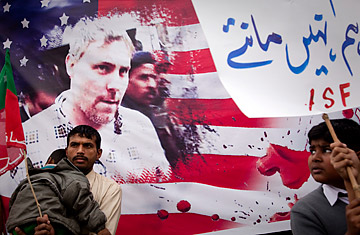
Protesters stand next to a banner bearing an image of U.S. consulate employee Raymond Davis, who shot dead two local men in Lahore, Pakistan, on Feb. 3, 2011
The U.S. has forced Pakistan to ease travel restrictions on its diplomats after it threatened to reciprocate by invoking international law, officials from both sides tell TIME. Washington hit back against unusual limits on the movements of U.S. diplomats that had been set by Pakistani authorities on the instructions of their country's top spy agency, the Directorate for Inter-Services Intelligence (ISI).
U.S. officials say that American diplomats in Pakistan have suffered harassment at the hands of the country's authorities, citing instances of midnight searches, tip-offs to local media about the movements of U.S. officials and lurid tales planted in the local press of diplomats conspiring with Pakistani politicians. Pakistani officials' most recent move was to restrict the ability of U.S. diplomats to travel freely within the country, citing "security reasons."
The squeeze on the activities of U.S. diplomats in Pakistan is the latest chapter in the ISI-CIA spy war that has been slowly escalating since the arrest of CIA contractor Raymond Davis after an incident in which two Pakistanis were killed, reaching a fever pitch following the U.S. military raid that killed Osama bin Laden on Pakistani soil.
The dispute over travel restrictions comes on the heels of the departure of the CIA's second Islamabad station chief in just seven months; an unnamed official was evacuated for "medical reasons" a fortnight ago but will not be returning to the Pakistan post. The CIA declined to comment for this story.
In its easing of the travel restrictions, Pakistan furnished the U.S. embassy in Islamabad with blanket "no objection certificates," allowing the diplomats to move unimpeded within the country for a month. Despite the waiver, the restrictions remain formally in place. U.S. diplomats may still be asked to demonstrate that they have permission to travel and will have to seek extensions of their no-objection certificates on a monthly basis. Under the Vienna Convention governing rules for diplomats, one official said, any restrictions imposed by Pakistan on U.S. diplomats can be reciprocated by Washington.
